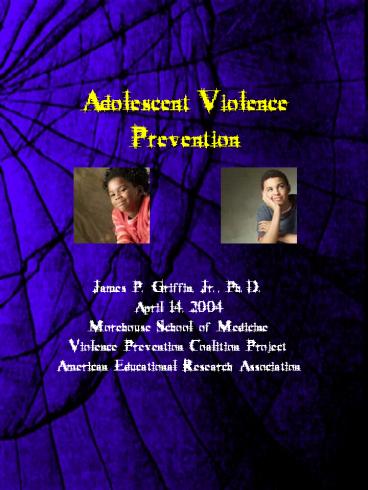Adolescent Violence Prevention - PowerPoint PPT Presentation
1 / 28
Title:
Adolescent Violence Prevention
Description:
Consistency Management and Cooperative Discipline. BASIS Model. Dealing with Escalating Students. Stress Management. Nested Intervention (Program within a program) ... – PowerPoint PPT presentation
Number of Views:22
Avg rating:3.0/5.0
Title: Adolescent Violence Prevention
1
Adolescent Violence Prevention
- James P. Griffin, Jr., Ph.D.
- April 14, 2004
- Morehouse School of Medicine
- Violence Prevention Coalition Project
- American Educational Research Association
2
Overview
Scope of the Problem Risk and protective
Factors Violence Prevention Program Methods of
Violence Prevention Community-level Youth
Advisory Boards Solutions Focus on positive
behavioral characteristics Male
Re-socialization Resiliency Net
3
Scope of the Problem
4
10 Leading Causes of Death, United
States 1981-2001 Black Males Ages 10-44 1.
Homicide Legal Int. 143,984 2. HIV 101,220 3.
Unintentional Injury and Adverse Effects
77,188 4. Heart Disease 59,707 5. Malignant
Neoplasms 37,401 6 Suicide 26,169 7.
Cerebro-vascular 11,974 8. Liver Disease 13,426
9. Pneumonia Influenza 8,412 (no 99-2001 data
available) 10. Diabetes 6,684
5
1994 - 1998 United States Homicide and Legal
InterventionAges 10-44, Black, , Males Total
Deaths 35,928 Cause of Death Numberof
Deaths Percentage of Deaths Homicide Firearm
30,549 85.0 Homicide Cut/pierce
3,176 8.8 Homicide Other Spec., NEClt
773 2.2 Homicide Unspecified
684 1.9 Homicide Struck by or Against
315 0.9 Homicide Suffocation
218 0.6 Homicide Other Spec. 84 0.2 Homicid
e Fire/burn 83 0.2 Homicide Drowning
17 0.0 Homicide Fall 16 0.0 Homicide
Poisoning 13 0.0 Total Deaths 35,928
6
Violence Related Deaths Due to Homicides by
Firearms in the 10 to 44 Age Group, United States
7
Black Male Deaths on a Local Level
8
(No Transcript)
9
(No Transcript)
10
30318
30314
30311
30032
30310
30315
30331
30349
11
30318
30383
30388
30310
30332
30038
30358
30311
30316
30315
30381
30334
30381
30338
30354
30381
30349
12
Number of Deaths Black Males and Black
Females The number of deaths among black males
for both counties (Fulton and DeKalb) was 1,013
and 203 for black females from 1994-2002 .
13
Risk and Protective Factors
14
15
Protective Factors
Gender--Girls less likely to develop problem
behaviors Resilient temperament--adjust to
conditions Outgoing personality Intelligence Cl
ear expectations and boundaries Strong,
affectionate relationship with a caring adult
16
Violence Prevention Program
17
Violence Prevention Program Structure
School-wide Action Planning Team School-wide
initiatives Professional Development and
Organizational Development Consistency Management
and Cooperative Discipline BASIS Model Dealing
with Escalating Students Stress Management
Nested Intervention (Program within a
program) Curriculum-based instruction in
violence prevention
Comparison Middle School Regular School Program
18
Violence Prevention Program Findings
19
(No Transcript)
20
(No Transcript)
21
(No Transcript)
22
Community-level Youth Advisory Boards
23
Solutions Focus on positive behavioral
characteristics Adolescent Prosocial
Resiliency Scale
24
Alternative School Male Re-socialization Manhood
Development Training
Training designed to re-define who we are as
African-American Men. Focuses on Development
of the whole man Development of physical
mental wellness Respect toward women You
dont refer to women as Bs and Hs
under any circumstances Adapting people who
treat you unfairly Spirituality Social
Responsibility Resiliency Net
25
Resiliency Net
Teach youth that part of becoming a
responsible African-American man involves forming
strong, positive, healthy relationships with
others and giving back no strings attached.
Older Generation
Peers (any lifestage)
Peers (any lifestage)
Younger Generation
26
Implementation of Resiliency Networking
Mentoring is a much needed intervention in
African-American communities, but we need to
teach supplemental service models as part of
becoming a successful African-American man or
woman.
ACTION OPTIONS Identify a promising youth. Have
lunch with the youth periodically. Act as a
sounding board dont preach or give advice.
Help them examine alternatives and resources for
meeting their goals. Teach youth to give back to
two behind them, and ask their mentees to do the
same. This promotes a geometric progression of
the process. ACCOUNTABILITY Encourage the
mentees to tell you how they are giving
back. Teach that in order to be a real man or
woman means that it is our responsibility is to
build up our communities and not to tear them up.
27
THANK YOU FOR YOUR ATTENTION!
28
James P. Griffin, Jr., Ph.D. National Center for
Primary Care Morehouse School of Medicine 720
Westview Dr., S.W. Atlanta, GA 30310-1495 404-752
-1905 griffij_at_msm.edu































